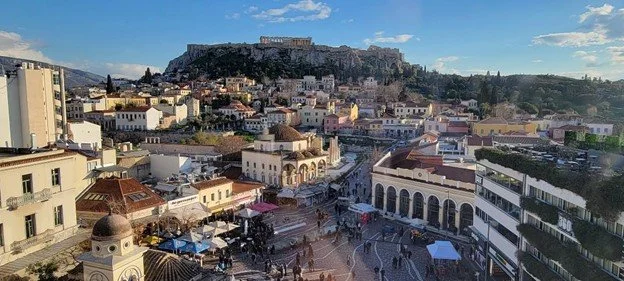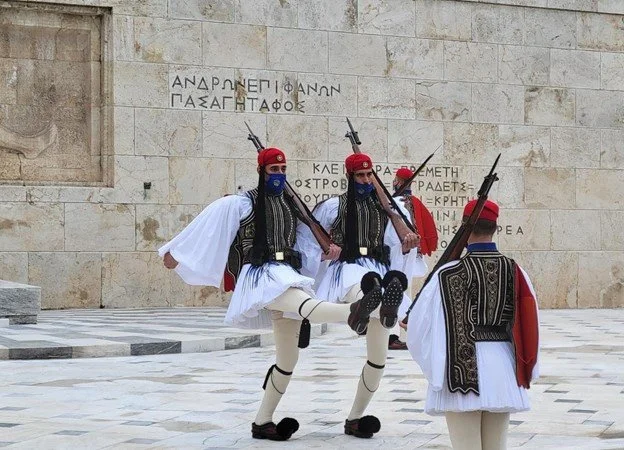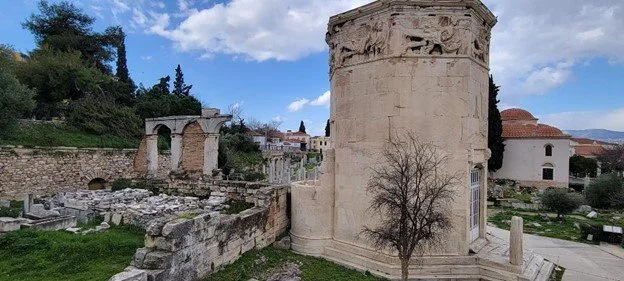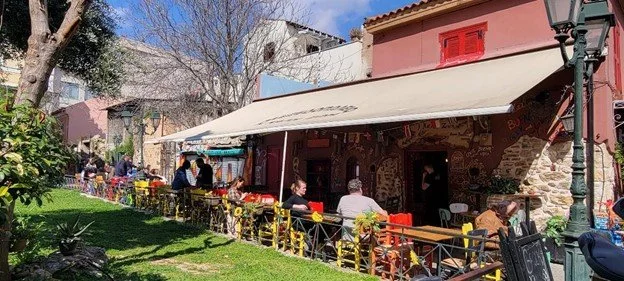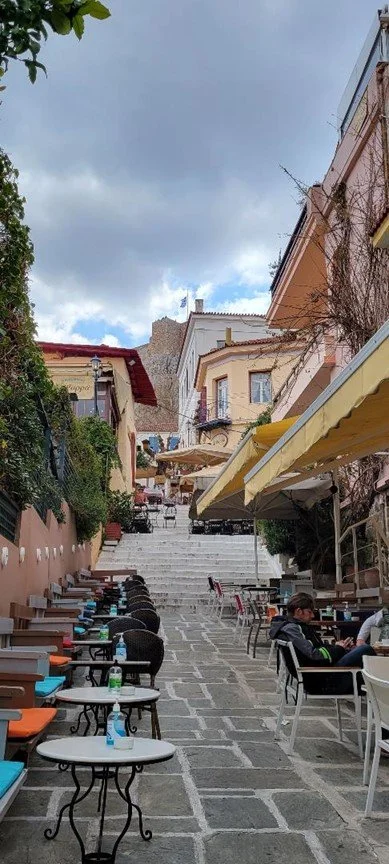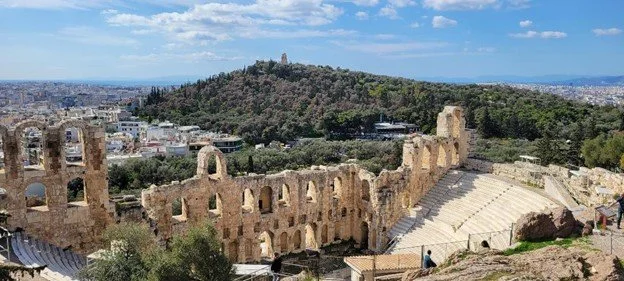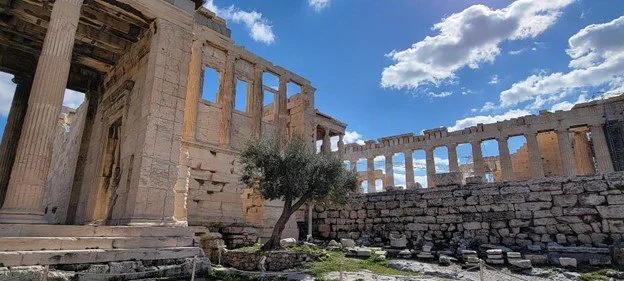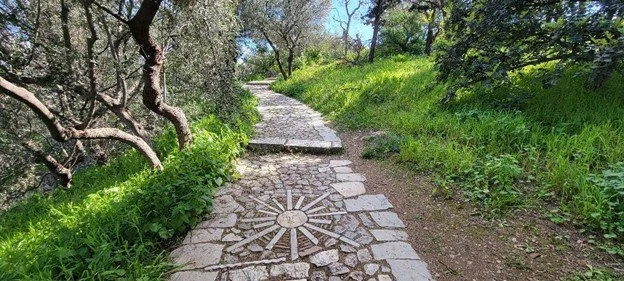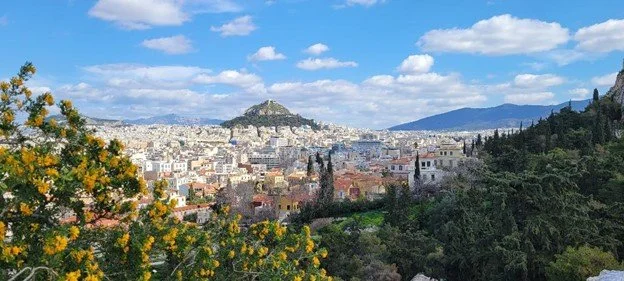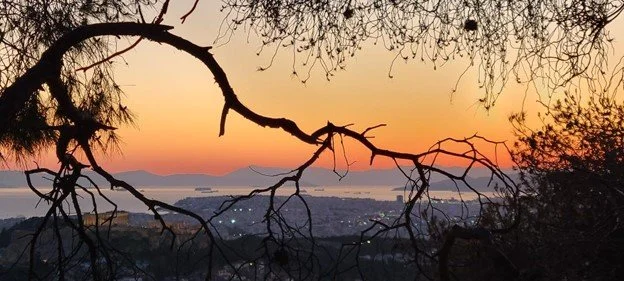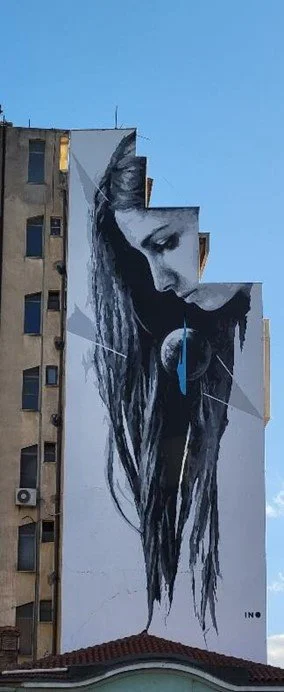Athens.Gods and leadership thoughts
Hi players,
Athens. Strangely, we did not plan to go to Athens. The decision sort of emerged organically without too much thought.
Are you familiar with the feeling that you suddenly know something without actually going through the process of thinking about it? This is exactly how we decided to go to Athens.
We just knew we wanted to. We have never been; it is a relatively short flight, the weather is comfortable. Perfect destination. I have never given this weird decision process much thought until recently.
A few weeks ago, I first learned about “phronesis” from Dr. Chen Gratz-Shmueli, in the organizational consulting program I am currently attending. “Phronesis” was coined by the Greek philosopher Aristotle (Greek !!! MMM), which in a nutshell is “practical wisdom.” In my words, it’s the accumulation of all the practical tools, knowledge, and experience that we bring when we face a situation we need to solve. . Practically speaking, it is the “full” package of who we are.
Love in Psyrri neighborhood
Whether or not mentioning Aristotle, wisdom, or both at the same time created a “phronesis” ‘s reaction, I was inspired magically to book the flight to Athens. In less than a week, we were sitting on the plane, fully (4 times) vaccinated, equipped with a negative PCR test, a kn95 suffocating mask, excited to walk in the path where so many wise philosophers walked before us.
As we landed, I could immediately feel the winds of inspiration…(from the ac in the taxi). We had four full days to explore Athens. It was enough to visit all the “must-see” attractions and indulge ourselves with long coffee breaks (and some extra calories…).
The first day is always hard.
I wake up, and I am never sure where I am
To make things easier, it has become a habit of taking a “free-walk” tour on the morning of the first day. I find this tour an excellent city orientation from which to choose the preferred spots for a deeper visit later. I usually love those tours with a diverse crowd from around the world; they are facilitated by local students who have great tips, and you tip them at the end. (it’s not necessarily cheaper).
I must admit that this time, I wanted more from the guide. He was a great example of someone who knows a lot but needs more storytelling ability. (as a result, it was a boring tour). Nevertheless, the route was excellent, and we got some great tips from the other group members for the rest of our stay. (In general, I think that the habit of taking time for orientation is excellent practice for every new beginning, whether professional or personal, and having local ‘guidance’ is a bonus) .
Enough with the introduction; let’s start our journey.
Monastiraki Square was our first stop. You can see the Acropolis’s beautiful view from the rooftop at the “A for Athens” nearby.
I added a tasty sangria. (I know it’s not Greek, but it’s sangria.) The next stop was the flea market. (I am not a fan. I always wonder who buys it. I am pretty tempted to sell some of my old stuff.)
Monastiraki square. View from the “A for Athens” Bar
Syntagma Square is the place to watch the shift exchange of the guards at the Monument of the Unknown Soldier in front of the Hellenic Parliament and the Presidential Mansion. I was excited to see the Israeli flag hanging next to the Greek. I guess the Israeli president and I had the same epiphany, and he, too, was in Athens. Though it was Thursday, the guards wore their Sunday uniforms for the presidential visit. (the festive ceremony exchange takes place every Sunday at 11:00 am ). For me, the real attraction of the shift exchange was the “horse” like moves that the guards performed. These unusual moves reflect how strong a tradition is. The tale goes that when the 17-year-old King Otto moved from Bavaria to Greece to take the throne (in 1832 ), he could no longer hear the sounds he loved – that of horses. So he made his guards walk in this fashion to replicate the sound and make him feel like he was closer to home.. Everyone has strange habits. (even Leaders). It can be nice if we all get more curious about ourselves and each other. There is always a reason why we do things. Knowing means, we can act differently if it doesn’t serve us anymore.
Royal guard
They chose to keep the tradition. Tradition is a mysterious thing. Even though it may rarely make any sense in the present, it serves as a reminder of the past. It sets us apart from others; it connects us to our history. I could not help but wonder whether my generation will contribute to any tradition that can last for centuries. Regretfully,
I could not think of anything significant, but maybe our only humble role is to preserve and forward the traditions passed to us.
After watching the perfect synchronicity between the soldiers (who have been trained for months to perform this perfectly), we went down history lane…
I must confess that I am not a big admirer of ruins, so I was satisfied with a short visit to the Ancient Agora, Temple of Olympian Zeus, the Hadrian’s arch, Horologion of Andronikos Kyrrhestes (the tower of the winds). If you love it, you can spend days walking through the ruins, learning about the place’s history.
Tower of the Winds
After a few hours and too many ruins for my taste, it was time to rest.
By rest, I mean to eat something. The local food was very, very Greek to me.
I loved everything about it. There’s little chance you’ll be disappointed with the food.
I highly recommend trying the local Cheese Pie with Puff Pastry (any local bakery will do. trust me, we sampled a nice variety) with or without spinach.
It’s a savory treat. If you want something sweet, go for the Bougasta- custard between two layers of phyllo.
We walked 40 minutes for the perfect Bougasta in Vosporos bakery. (unfortunately, no website to quote). Another good spot for a sweet stop is Nancy’s sweet home in Psyrri https://www.nancysweethome.gr/.
No perfect day can end without a good Gyro or Falafel.
I can’t mention one specific place; all were good. We just followed the locals and enjoyed every bite.
Combine it with tzatziki and a Greek or cabbage salad or a grilled fish, and it’s a “GOOD “night. There are many taverns where you can eat and enjoy local music. We tried the “Aris Tavern” in the central market, which was tasty and affordable.
Our second day was dedicated to the Acropolis, which is the main tourist attraction of Athens. When you walk around and look up, you can see a part of the Acropolis almost from any street corner in the city.
Acropolis. view from the street.
Looking at the Acropolis standing high above, I immediately thought about leadership and how leadership feels.
The presence of the Acropolis felt like great leadership. I didn’t have to look up to know it was there, and when I looked, it was. Looking up, I felt protected, but I guess it can make some feel small and incompetent if it’s not approachable.
The Acropolis seemed very impressive when you are still downhill, but it was even more special as I climbed up, reached the top, and stood on the wide-open, flattish-topped rock.
Acropolis. Theatre of Dionysos. (still open for shows)
All the ancient buildings in the Acropolis the Parthenon, the Propylaea, the Erechtheion, and the Temple of Athena Nike, are damaged and are under restoration. Despite the damage, you feel empowered by their magnitude.
This is precisely what great leadership is. It doesn’t just look great from afar; it’s still great when you interact with it directly. It’s still great, even when you get to see its flaws. You can feel the leadership’s presence even if it’s not perfect or complete or needs some restorations, just as everyone else.
The thoughts about better leadership have not left me,
I felt the history of this place had more things to teach me. You might think that Greek Mythology is for children, but I love tales and even more tales about wise women. Here is one tale that explains why Athena – the Goddess of wisdom became the patron of the city (and eventually Athens is named after her).
The story goes that Athens was so beautiful that it caught the Gods’ attention. Every one of the Gods wanted to become its Patron.
It became a heated discussion in Olympus, so Zeus decided that the two strongest contenders, Poseidon, the king of the sea, and Athena, would offer gifts to the city, and the most valued gift would win.
Poseidon was the first to present his gift.
He cracked fiercely the ground and a spring of water emerged. Water was valuable, but when the crowd tasted it, it was salty and undrinkable.
Athena’s turn came second; she knelt and planted a seed. An olive tree sprang up. The crowd cheered.
They loved her gift; the trees could provide shade, olives for food, oil for the light, and the less productive trees could be used for burning or furniture and tools.
Athena’s wise gift won, and she became the patron.
My take-in about leadership from this story is simple:
· Get down from the ‘Olympus’ and meet the people where they are.
· Share your unique gifts. Some will like it; some will not.
· Wisdom wins power.
· Leadership is the art of growth that creates value for everyone.
Acropolis. Erechtheion.
Anastasia, our guide (whose tour I had booked at the entrance gate to the Acropolis after the best ‘elevator’ pitch I had ever heard, two seconds at the most)
as pointed to the path where Aristotle would take his students for a walk.
He believed and I agree that if you walk in a beautiful place, you learn better..She also mentioned that when Aristotle needed quiet time for inspiration, he walked by himself toward Philopappou Hill (the hill of the muses).
The path to the Philopappou (The Hill of the Muse)
I followed the same path as a good student, hoping to find my muse. When I reached the hill (after 15 minutes), the muse was nowhere to be found, but the beautiful view of the Acropolis was enough inspiration to write about it.
Leadership doesn’t mean you always get what you plan, but if you take the time to pause, to be inspired, something else may appear instead.
Be willing to stay flexible and stray away from your original plan. Life is not linear. As long as you are moving in the right direction, it’s enough.
Lycabettus Hill (in the distance)
As we were already in a walking mood, we decided to head directly to Lycabettus Hill. The hill is the highest point in Athens, and you can enjoy a 360-degree view of the city. It is mainly visited in the evening close to sunset, but honestly, the sunset was not as impressive as I imagined, but the view was incredible.
Be mindful that you can walk on foot all the way up, but I recommend taking the cable car for the less physically fit.
We took the cable car,since we had enough challenges for one day , but we went on foot downhill, and it looked pretty steep.
Sunset on the way down from the Lycabettus Hill
For the rest of our stay, we enjoyed just walking in the different neighborhoods; the small allies are charming have great coffee places, bakeries, restaurants, and bars. The Plaka and Psyrri are the most toured neighborhoods.
Athens is heaven for murals and graffiti lovers, and as such, I have extended our walks to less-traveled neighborhoods, like Gazi and Exarchia.
I was keen to see as many murals as possible.
You can easily find and book a graffiti tour, but I enjoy the discovery process and the excitement of finding hidden graffiti in the urban space.
Grafitti by INO (we spotted more than 10 INO works around the city. I now have a full gallery on my cellphone)
To be honest, my hubby did all the navigating, but hey concerning leadership skills, one should know all the strengths and weaknesses and delegate the tasks accordingly.
We ended our Athena adventure with a must-stop in the central market (I would avoid the meat section..) and bought the famous Greek pistachios and a kalamata olive spread. Food is the best memorabilia.
As I looked for final words of inspiration to summarize this travel and my thoughts on better leadership, I found wisdom in this quote:
“We are what we repeatedly do. Excellence then is not an act but a habit” Aristotle.
I think I would like to excel in Travel 😊 I am ready to repeat…
Playfuly yours,
Rina


